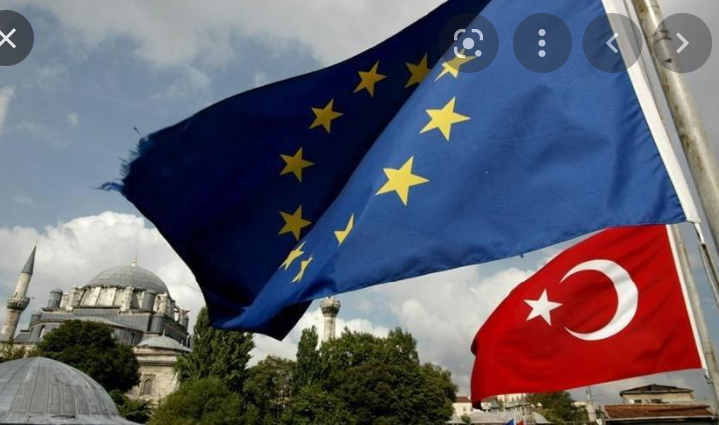The EU General Affairs Council held its regular meeting this month and issued a statement summarizing the debates. The space allocated to Turkey-Greece and Turkey-Greek Cypriot relations was disproportionately larger than that given to other issues pertaining to Turkey-EU relations.
Turkey’s EU accession process seems to have become a miscellaneous issue on the EU agenda. While Turkey used to be treated as a special case in its relations with Brussels, it is now included in a group of Balkan countries, such as North Macedonia and Montenegro, which became independent decades after Turkey applied for membership.
Relations between Turkey and the EU were established in 1959 and the institutional framework was formalized with the 1963 Ankara Agreement. In 1999, the EU decided to admit Turkey as a candidate country. Accession negotiations so far have been opened in 16 out of 35 chapters and concluded in only one — science and research. In other words, Turkey has been kept on the doorstep for more than half a century.
WATCH: 2022 Predictions For Turkish Politics
Another question that occupies a disproportionate space in the EU council’s statement is Varosha, a suburb of Famagusta in northern Cyprus. This area was vacated by its inhabitants when the Turkish army in 1974 carried out a military operation to prevent the annexation of the island by Greece. UN Secretary General Kofi Annan has drafted a plan for the solution of the Cyprus problem, which includes the return of the original inhabitants of the area, but Greek Cypriots rejected the plan in a referendum in 2005.
In October last year, Ersin Tatar, president of northern Cyprus and leader of the Turkish Cypriot community, with strong support from Turkish President Recep Tayyip Erdogan, decided to open up part of the fenced area. Greek Cypriots fiercely opposed this and took the issue to the relevant EU forums.
This question must have been thoroughly debated two weeks ago in the EU General Affairs Council. The council statement reads: “The ministers expressed their solidarity with the Greek Cypriots and agreed to refer the question to the Coreper (Committee of Permanent Representatives of the member countries) for further evaluation of all options including to work out a sanctions’ regime for everyone who played a role in the opening up of Varosha.”
This wording looks like lip-service to the Greek Cypriots, rather than coercive action against the decision-makers over steps taken on the Varosha issue, since the main actor who allowed the opening of Varosha is Erdogan. Will the EU impose sanctions on the Turkish leader? If it does, to what extent will such curbs have a practical effect? What will be the implications of imposing sanctions on the president of a NATO country?
If, instead, Erdogan and Tatar are spared and the sanctions target only the subordinate officers, this will be inconsistent. The council may be looking for a way out of this dilemma.
The council also took note of the recent resumption of high-level dialogue between the EU and Turkey on several issues. These talks may unfold positively as long as the negotiations are left to professional diplomats. However, Erdogan always has the last word — and it is not easy to predict what this last word will be. The Turkish leader is unlikely to make easy concessions without receiving equivalent concessions in return.
The longest paragraph in the Turkey chapter of the EU council statement pertains to Turkey’s backsliding in the areas of democracy, fundamental rights, rule of law and the lack of an independent judiciary. In this context, it also refers to Turkey’s failure to implement the verdict of the European Court of Human Rights. Although the court is not an EU institution, failure to implement a verdict is seen as contradicting the rule of law.
The Turkey chapter concludes with a bitter note saying that “accession negotiations with Ankara have effectively come to an end and no further chapters can be considered for opening or closing.” In a sense, this looks like the end of Turkey’s EU hopes. Negotiations might be revived when the Erdogan era comes to a close, but it will take time to relaunch everything from scratch.
This important news went almost unnoticed in the Turkish media. At the top of Turkey’s ruling Justice and Development Party, such a statement would usually cause a hurricane of comment and debates. This time only those who are professionally following the events noticed it, and even they did not bother to comment.
Yasar Yakis is a former foreign minister of Turkey and founding member of the ruling AK Party.
Follow our English language YouTube videos @ REAL TURKEY: https://www.youtube.com/channel/UCKpFJB4GFiNkhmpVZQ_d9Rg
And content at Twitter: @AtillaEng
